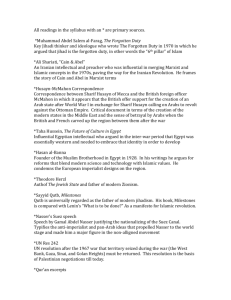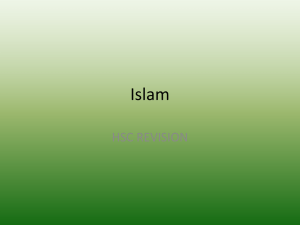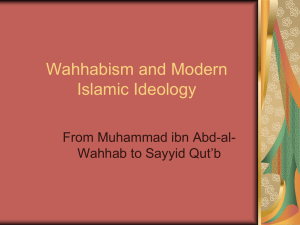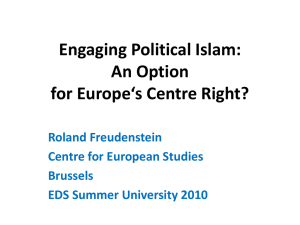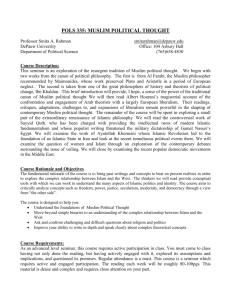The Qutbian Project - Islamic Philosophy Online
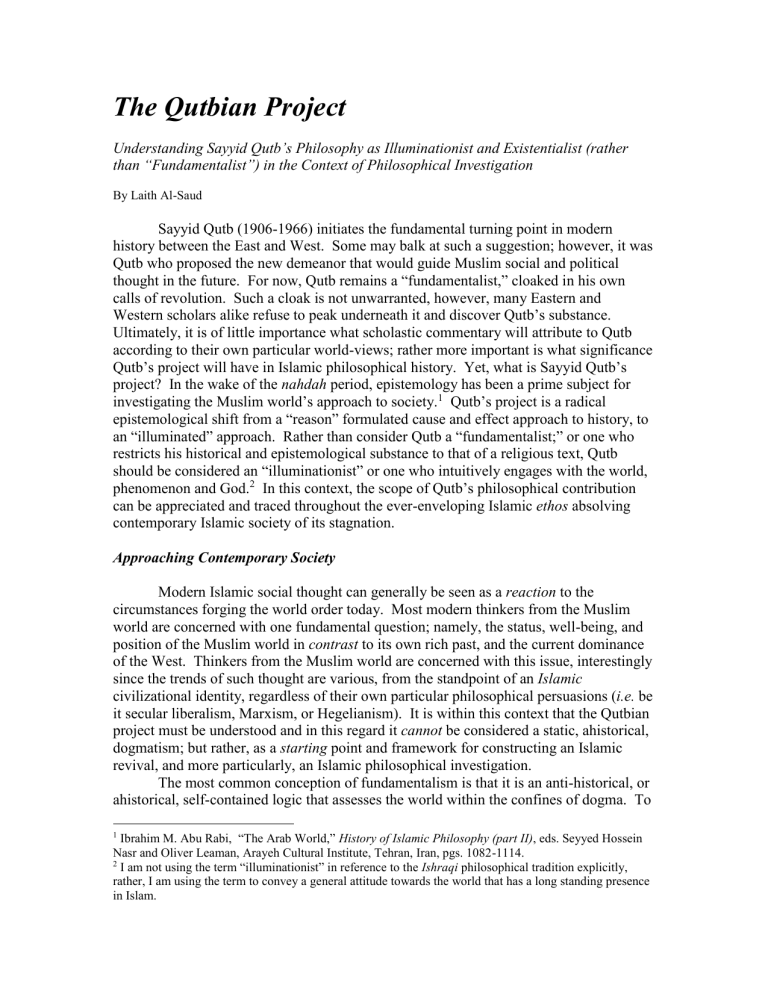
The Qutbian Project
Understanding Sayyid Qutb’s Philosophy as Illuminationist and Existentialist (rather than “Fundamentalist”) in the Context of Philosophical Investigation
By Laith Al-Saud
Sayyid Qutb (1906-1966) initiates the fundamental turning point in modern history between the East and West. Some may balk at such a suggestion; however, it was
Qutb who proposed the new demeanor that would guide Muslim social and political thought in the future. For now, Qutb remains a “fundamentalist,” cloaked in his own calls of revolution. Such a cloak is not unwarranted, however, many Eastern and
Western scholars alike refuse to peak underneath it and discover Qutb’s substance.
Ultimately, it is of little importance what scholastic commentary will attribute to Qutb according to their own particular world-views; rather more important is what significance
Qutb’s project will have in Islamic philosophical history. Yet, what is Sayyid Qutb’s project? In the wake of the nahdah period, epistemology has been a prime subject for investigating the Muslim world’s approach to society.
1
Qutb’s project is a radical epistemological shift from a “reason” formulated cause and effect approach to history, to an “illuminated” approach. Rather than consider Qutb a “fundamentalist;” or one who restricts his historical and epistemological substance to that of a religious text, Qutb should be considered an “illuminationist” or one who intuitively engages with the world, phenomenon and God.
2
In this context, the scope of Qutb’s philosophical contribution can be appreciated and traced throughout the ever-enveloping Islamic ethos absolving contemporary Islamic society of its stagnation.
Approaching Contemporary Society
Modern Islamic social thought can generally be seen as a reaction to the circumstances forging the world order today. Most modern thinkers from the Muslim world are concerned with one fundamental question; namely, the status, well-being, and position of the Muslim world in contrast to its own rich past, and the current dominance of the West. Thinkers from the Muslim world are concerned with this issue, interestingly since the trends of such thought are various, from the standpoint of an Islamic civilizational identity, regardless of their own particular philosophical persuasions ( i.e.
be it secular liberalism, Marxism, or Hegelianism). It is within this context that the Qutbian project must be understood and in this regard it cannot be considered a static, ahistorical, dogmatism; but rather, as a starting point and framework for constructing an Islamic revival, and more particularly, an Islamic philosophical investigation.
The most common conception of fundamentalism is that it is an anti-historical, or ahistorical, self-contained logic that assesses the world within the confines of dogma. To
1 Ibrahim M. Abu Rabi, “The Arab World,” History of Islamic Philosophy (part II) , eds. Seyyed Hossein
Nasr and Oliver Leaman, Arayeh Cultural Institute, Tehran, Iran, pgs. 1082-1114.
2 I am not using the term “illuminationist” in reference to the Ishraqi philosophical tradition explicitly, rather, I am using the term to convey a general attitude towards the world that has a long standing presence in Islam.
this end, fundamentalism is inherently anti-“modern” and anti-“progressive” in that the
“ideology” proposed by such “fundamentalists” has nothing to learn or gain from outside the bounds of its own framework. Modern Muslim thinkers who propose an Islamic political agenda have been accused of fundamentalism more often than not. The basic justification being that to propose a “religious” state is to withdraw and segregate from the rational and inherently more sophisticated “democratic” counter parts; models which have emerged out of more “free” and “rigorous” philosophical discourse. Obviously, a value judgment is made when describing particular modes of thought as fundamentalist; the notion being that non-fundamentalist models (usually secular in persuasion if not identity) are more neutral in their approach to knowledge and, therefore, more rigorous in their pursuits. Without entering into the debate about the actual neutrality of such models, a closer analysis of Sayyid Qutb’s work reveals the depth and complexity of his philosophical thought, encouraging a more fluid appreciation of his work.
Qutb’s contention is that, indeed, current philosophical models are themselves static and “fundamentalist” because they do not rest on the appropriate foundation. In making an inventory of modern Islamic philosophical concerns, the most consistent theme is that of social re -construction.
3
The philosophical ideas of the West have allowed it to flourish, in which the “creative genius” of the West is fully acknowledged by Qutb; yet the stagnation of Islamic social ideas allowed the eventual withering away of Islam’s creative fruits.
4
The Qutbian project is an address to what he sees as the integral root of this problem; namely the nature by which we approach the world, notably due to a lack of awareness of its quality.
Qutb sees the philosophical, in particular the epistemological, rules governing contemporary society as incoherent and this incoherence is due to the lack of appropriate consciousness . And perhaps, personified in Qutb, is the valley dividing Eastern and
Western thought; that the epistemological foundation in the West continues to be
Aristotelian, in which the pursuit of metaphysics is carried out and through the pursuit of physics . The epistemological heritage of the Muslim world, however, traces its lineage through a spiritualized history as manifested in experience ; that experience being social and individual; expressed in the form of prophetic tradition, historical movements, and innate knowledge. Qutb recognizes that the “objection” to the latter approach to the world is the lack of “demonstrative” proof; however, Qutb’s objection to the former is the absence of quality and value.
5 All contemporary economic, scientific, and aesthetic theory has no awareness of the God-world relation as it actually is, or even recognizes the innate necessity to indicate such a relation; as such, contemporary “knowledge” has no relation to reality for Qutb. Contemporary knowledge in any particular field of thought, whether it is philosophy, the social sciences, or history, has assessed itself by its own methods rather than by way of an absolute metaphysical reality that indicates truth and falsehood. The God-world relation has been subjected to the discourse of such disciplines perversely rather than serving as the foundation that buttresses them, as a world-view should. Islam for Qutb is a world-view , while intellectual disciplines are tools to facilitate the understanding of world-views. Intellectual disciplines are not, however, qualified to be world-views themselves; philosophy (as it is traditionally
3 Antony Black, The History of Islamic Political Thought , Routledge, New York, 2001, pg. 279
4 Sayyid Qutb, Milestones , IIFSO, Salimiah, Kuwait, 1978, pg. 12
5 Ibid , pgs. 13-15.
espoused, in Greco-Roman fashion) is not equipped with the appropriate conceptual or categorical qualities to serve as a world-view, which Qutb claims has been the case in contemporary society. Contemporary thought, therefore, cannot become in the sense of being commensurate with the development of man. Rather, in the form of language and self-contained logic, it imposes a reality that is, ultimately, subjective and deficient, rather a metaphysics must be established if philosophy is to have any truth value.
Qutb wishes to propose Islam as the appropriate philosophical system by which to mediate economic, scientific, and aesthetic thought; however, he finds the root of understanding and the foundation of philosophy to be an issue of epistemological quality .
6
The ideas of the twentiethcentury have been fashioned by the framework of
“rationalism;” a descendent of the Aristotelian tradition, and the assessment of history has been based on a causal or dialectical basis.
7
In light of the so-called scientific age, the resurrection of the Aristotelian project has once again worked from the ground up, observing the empirical relations of society and historical events and thereby extrapolating metaphysics. In approaching history we have, according to Qutb, imposed a stale rational order that is negligent of the dynamics of society.
8 Our thinker is very sensitive, not only to the contemporary presence of Greek methodology in Islamic thought; he also critiques some of the early and most celebrated presences of Aristotelian thinkers in Islamic history, such as Ibn Sina and Ibn Rushd.
9
Causal or dialectical orders are by their very nature materially based, for their empirical observations are the only predictable foundations that can facilitate a method that reaches back into history consistently and projects forward into the future with certainty.
10
In the absence of this basis, no causal or dialectical method is possible for its rational envelopment cannot be detected. For Qutb, the implication of this epistemological method is the replacement of metaphysics with history, fundamentally flawing our understanding of human nature, religion, and most significantly, Islam.
The employment of rationalism, as a continuation of the Aristotelian project, can hardly be attributed to the Hegel and post-Hegel discourse of the West exclusively.
Rather, it levies a tremendous following in the Muslim world in the philosophy of Ibn
Rushd, as we have mentioned, as well as Ibn Khaldun and such contemporary figures as
6
The construction of Aristotelian logic has subjected reality to defined terms by which the nature of that reality may be assessed and determined; this is the essential characteristic of Aristotelianism. History has been the subject of the Aristotelian method in many ways, but to site two major examples in the Western philosophical tradition, we have Hegelianism and Marxism. Through the observation of defined , that is definitive, categories throughout history (for example the relationship of consciousness and nonconsciousness or consciousness and labor) we “discover” a systematic unfolding of history as an almost scientific manifestation of causal relations. Qutb suggests that this method of assessing reality is perverted for it identifies history as metaphysics; rather than acknowledging the “rational” discourse as a utility, it supplants metaphysics with physics. An authentic Islamic philosophy, however, understands that the dynamics of history and society are themselves subject to metaphysics, which of course is the God-world relation. The epistemology of the West lacks the quality of correspondence to reality.
7 Ibid, pgs. 7-10.
8 Ibid
9 Sayyid Qutb, Social Justice in Islam, trans. J. Hardie, Maktabat Misr, Cairo, Egypt, 1945, pg. 17
10 Hegel’s dialectical method, adopted later by Marx, although ultimately Idealist, is predicated on an observation of historical events (which are empirical) as shaping the Ideal. The past, therefore, can be immutably extended into the future as a series of dialectical manifestations.
Muhammad Abed al-Jabri.
11
It is initially within the Islamic tradition that Qutb is most concerned, however, only initially. Qutb views the “rationalist” method as breaking down the coherent foundations of knowledge, in particular in science and philosophy, where it is most esteemed; for it has replaced the objects of knowledge, namely nature and society, as the object of metaphysics and, therefore, the ultimate reality of an
Absolute Being and the God-world relation.
12 The subject (man) has therefore taken on the object as the subjective force of reality , debilitating its own pursuit of a metaphysical reality.
Qutb’s own metaphysics become important here, for as a typical
“fundamentalist,” as he is often referred to, it would be assumed that Qutb’s notion of the
God-world relationship is purely transcendent. Qutb’s commentaries on the Qur’an have caused controversy with suggestions that he was a panantheist.
13
The transcendence of
God is the most facilitating notion of God to the believer and the rationalist, for it abstracts Being (in the sense of the “Absolute Being” of God in Qutb’s commentaries) from the empirical order, thereby permitting the observation of existents predictably, rather than the realization of existence as Absolute Being. Qutb’s thoughts on this matter will be of importance later, however, Qutb’s major metaphysical thoughts can be found, most notably, in his In the Shade of the Qur’an , his masterful commentary on the Holy
Text.
On Qutb’s commentary of Sura al-Ikhlaas , he takes deliberate measures to delineate his metaphysical position.
14
Thus,
The Arabic term “Ahad” used here to refer to the unity of Allah is much more precise than the term… “Wahid” which means “one.” “Ahad” has the added connotations of absolute and continuous unity and the absence of equals. The unity of Allah is such there is no reality and no true and permanent existence except His…Once this belief has become clear and that explanation has established itself in the human mind, the heart is purified of all falsities and impurities and it is released from all ties except those of the one and unique Being who alone possess the reality of being and who is the only effective power in the world.
15
As we can see, Qutb’s philosophical stance is rooted in his awareness and understanding of the God-world relationship as Absolute Being and furthermore, it seems he wants to deny the status of actual being to existents , an essential epistemological assertion regarding rationalism as an approach to the world. This is an undercutting of many of Qutb’s contemporaries and their philosophical foundations; furthermore it is a debate that can be traced back to al-Ghazali and his burdensome and brilliant critique of philosophy in the Muslim world. By denying individuated existents status, they can no longer facilitate absolute knowledge, which also means they cannot provide answers to the more fundamental issues regarding man, law, and society. Rather, Qutb’s project is to provide not only an epistemological alternative, but also a new understanding of
11 For a wonderful and concise introduction to al-Jabri’s thought, see al-Jabri’s Arab-Islamic Philosophy: A
Contemporary Critique , published by the Center of Middle Eastern Studies, University of Texas at Austin.
12 Qutb, Milestones , pgs. 14-15.
13 The notion of “pantheistic” philosophy does not exist in Islamic thought, although the presence of pan an theistic thought, perhaps, does.
14 Sayyid Qutb, In the Shade of the Qur’an , Vol. 30, trans. M. Salahi and A. Shamis, Taj Company, New
Dheli, India, 1990.
15 Ibid , pg. 350.
epistemology by which to provide such answers. And here we run into one of the fundamental problems of Qutb’s own method, that of possibly assuming a metaphysics dogmatically, rather than epistemologically. Abed al-Jabri observes the tendency amongst “fundamentalists” to assess the world subjectively, that is the object, the world, metaphysics, et cetera , is assessed as an extension of the ideological content of the subject. Abed al-Jabri does not reserve the distinction of “fundamentalism” to Islamists alone, but Liberal and Marxist readings as well; which read history as the basis of their pre-existent ideology , rather than objectively assess whether history accurately corresponds with ideology.
16
Does Qutb merely relay a “fundamentalist” assessment of reality, history, and the God-world relation as Being, thereby not proposing an epistemology, but rather mere polemic? Qutb wants to make this same accusation against rationalists; therefore, is it possible for Qutb to suggest a religious solution outside of religious tradition? For the basis of Qutb’s metaphysics is, without question, the Qur’an.
Qutb is emphatic that theoretical development, whether religious or philosophical, must be based on realization (or illumination), rather than theology or theory.
17
With the overwhelming presence of illuminationist epistemology in Islamic thought, it is difficult to understand why Qutb’s work is not appreciated as more within the illuminationist tradition. The significance of his emphasis is that knowledge must precede theology. In
Milestones
, Qutb maintains that “realization” was the key factor in igniting Islamic civilization and substantiating the cultural and philosophical gains made therefrom.
Realization, for Qutb, substantiates philosophical and scientific gain, giving it direction, purpose, and relation to Absolute Being or God. In his historical analysis, Qutb distinguishes the features of early Islamic society from contemporary society as a difference in consciousness . Qutb is often misunderstood in this regard; he was far less concerned with behavior than with epistemology. The current paradigm regarding
Islamic “fundamentalism” or any “fundamentalism” is that proponents of such systems hope to enforce behavior in the absence of consciousness and that eventually behavior directs consciousness. According to Qutb, Islamists continually enjoin individuals to embrace Islam as an ethical and behavioral code that cultivates consciousness, much as a mystic would invoke ascetic practice as a means of cultivating consciousness.
18 This is an inversion of the nature of religion and knowledge for Qutb. An epistemological breakthrough must be reached prior to the expounding of any philosophical or theological system and such a consciousness must be “purified” and unadulterated of theory, for theory subjugates reality to a final and definitive conclusion. We can also, however, trace the roots of the existential position versus that of the rationalist or empiricist in Qutb’s work, the notion that theory subordinates awareness to a relationship of existents , rather than understanding history and society as modes of existence .
In the context of contemporary Islamic thought, Qutb addresses the manifestation of this actual movement in history; often Islamic thinkers cite the Mutazalia’ period as the zenith of Islamic philosophy, and consequently, civilization. Qutb, however, adopts a different paradigm. Early Islamic society, that is, within the lifetime of the Prophet
16 Muhammad Abed al-Jabri, Arab-Islamic Philosophy: A Contemporary Critique , trans. Aziz Abbassi, the
Center for Middle Eastern Studies, University of Texas at Austin, 1999, pgs. 9-14.
17 Sayyid Qutb’s Milestones acts as a manifesto delineating this exact point, the whole work can and should be read in this context.
18 Qutb, Milestones , pgs. 72-73.
(pbuh), was conscious of its relation to Absolute Being, not collectively , but individually , as such the individual embarks on becoming in terms of dissolving the borders of his awareness and being actually and consistently engaged with reality in every moment, thought, and act; the social order, thereby, becomes dynamic .
19
If the individual is not engaged in this relationship then we are reduced to merely organic entities, which act according to the nature of animals, according to our thinker this is what many contemporary philosophers, or perhaps more accurately sociologists and anthropologists propose.
20
Qutb is acutely observant in this regard; the notion of a social theory, which to be consistent must be based on “rationalism,” is by its nature general and inductive , assuming a collective posture regarding man’s nature. As such it is only capable of providing answers within a homogenous discourse in which all elements correspond with the respective theory. Furthermore, all proposals for social solutions are, as well, homogenous, ignorant of the dynamics of society, and the individual as the essential component of society. The anthropological or sociological paradigms, however, fall short; for it is evident (according to Qutb) that history testifies otherwise regarding the nature of man.
21 The observation of less complicated organic beings is simple and predictable for thought and act do not differ in such beings. In man, however, thought and act are not instantaneously concomitant; rather they struggle and change. Man, being dynamic, cannot be considered in the same way as organic elements of the world are considered. Islamic thought is in danger of adopting this poor understanding of man, therefore, Qutb seeks to de-construct homogenous tomes of thought that encapsulate the dynamics of society and encourage individual awareness as the only introduction to revival.
The social implications of Qutb’s project are immense for contemporary Islamic society. Abed al-Jabri maintains that the fundamental question facing Islamic thought, and the integral problematic of current Islamic epistemology, is that Islamic thought is inherently extended into the past as an immanent component of the present .
22
Qutb certainly falls within this framework and observes the present as a focal point of Islamic history and an attempt to manifest the consciousness of the past into the future.
23
In relation to the past, however, contemporary Islam relates to history collectively , as a social state of affairs of the present in contrast to a social state of affairs in the past. Qutb hopes to abolish collective consciousness and awaken individual consciousness, initially.
24
Awareness and Action
In the wake of individual awareness and relation to Absolute Being as a living reality, Qutb suggests that thought becomes action by the very nature of the content of thought. Unlike the theoretical guidelines that usually guide ideology, where a gap exists between theory and actualization, in Islamic awareness, action is a concomitant of
19 Ibid, pgs. 63-65.
20 Ibid , pg. 91.
21 Ibid
22 Abed al-Jabri, Arab-Islamic Philosophy , pgs. 1-15.
23 Qutb, Milestones , pgs. 37-77. For a comprehensive contrast and critique of this trend in Islamic thought see Abed al-Jabri’s Arab-Islamic Philosophy: A Contemporary Critique .
24 Ibid, pg. 34.
realization. The formation of the appropriate society, according to Qutb, always involves actualization rather than theory. As is well known, Qutb employs the term “ jahiliyya
” to denote the consciousness of contemporary society. The term “ jahiliyya ” denotes
“ignorance” in the Arabic language, and connotatively, refers to the pre-Islamic period, in which the Arabs practiced a primitive polytheism and adhered to tribal norms. Qutb’s choice of the term “ jahiliyya ” is indicative of his philosophical analogy.
In the absence of “pure monotheism,” Qutb suggests, man has no relation to
Absolute Being, that is, no relation to God, rather his relation is to meaning and custom , which involves the mere proliferation of meaning and custom, in other words, an empty science. Custom for Qutb is entirely subjective, for it is subordinate to thought systems and the context of the language employed. Interestingly, when we consider the value that is placed on meaning and custom, we are discussing the essence of meaning and custom.
When we assess man and history we assume a similar paradigm. Most notably, in referring to social thought and thought systems, it is the “essence” of history (within the greater scheme of reality) that is suggested; for example, the “essence” of history is dialectic or causal. For Qutb, the so-called “essence” of history has no correspondence in reality; rather it is constructed and imposed. The dynamics of the past are due to individuals , as the future is open to individuals.
25
God, the Absolute and only “real” Being, is constant actualization for Qutb.
Suggesting that God is also the only agent of actualization and phenomenon is a concomitant to “actual” Being. The above-cited commentary from Qutb’s In the Shade of the Qur’an
reads as an espousal of Sadrian metaphysics in which only Being is “real” and not essences , for essence always denotes the lack of change.
26 The influence of
“traditional” Islamic metaphysics on Qutb is a field in which, indeed, there is a great deal of work to be done. However, with Qutb maintaining this very significant metaphysical distinction from many “traditional” Islamic thinkers, his conception of man operates on a very different level from “traditional” Islamic social thinkers and calls into question the use of the term “fundamentalist” to describe him.
27
If according to the analysis, Qutb is an illuminationist thinker, then society is in the process of becoming , that is becoming
“real” and “valuable” only if it has a relation to God and is acting upon that relation.
History is, therefore, a manifestation of the God-world relation actualized in the form of constant Islam. The illuminationist discourse is not wishful thinking for Qutb; it is often and significantly actualized history, evidenced by the presence of prophets and religion as significant features of the world. Qutb’s thought cannot be abstracted from the advent of
Islam in this regard. Islam is the presence of the consciousness of the God-world relation
25 Antony Black, The History of Islamic Political Thought , pgs. 321-324.
26 Fazlur Rahman, Mulla Sadra’s Metaphysics , SUNY Press, New York, 1978. In this important commentary on Sadra’s metaphysics, Rahman outlines the philosopher’s ontological world-view regarding
Being. According to Sadra, only “Existence” exists , if you will, while essences are mental constructions imposed by the mind. What we see and identify as individual existents and subsequently identify with a correlating “essence” are actually modes of “Existence” or Being, rather than individuated ontological realities in themselves.
27 I am using the term ‘tradition’ in quotations to convey that the term is being employed purely for the sake of utility and not as a categorical distinction that has any ardent factual basis. In referring to Qutb, however, the term is justified in regard to his metaphysics. Qutb was not a historical metaphysician and his metaphysical observations are hardly of the same caliber of Sadra and other Muslim philosophers whose metaphysics occupied a major portion of their work and contributions.
and a natural consciousness at that. It embodies the reality of historical engagement with
God as a movement of total “submission” and “surrender” of the ephemeral order to
Absolute Being by recognition .
When man focuses on events or phenomenon as the focal point of his epistemology and understanding of history, then he is containing his awareness to a subjective reality that has no correspondence to the God-world relation, as such, for it has no “essence” or qualitative factor other than what is imposed on it by systematic thinking.
Religion often is interpreted in the “rationalist” discourse as an expression of materialism, a way to justify and solidify social productivity for a greater good.
28
This is to abstract religion from its historical participation. Rather, such epistemology is related to “falsities” and “impurities” as Qutb would describe them of allocating non-Being, or the phenomenal world, as the source of understanding . If we choose to understand history as a dialectician, we may; or if we choose to understand it as a determined causal chain, we may; for the “rationalism” that shapes these relations is only commensurate with our awareness
. In the absence of “awareness” of reality, knowledge has no firm foundation by which to engage action , for history is seen as a relation of events, rather than a relation to Absolute Being or, more elaborately, an expression of God. In the rationalist proposal, a system is assumed that is complete and functioning. Qutb confronts systematic thinking in ways reminiscent of Kierkegaard’s response to Hegel; history, rather, is dynamic for it involves the action of the individual .
Qutb’s objection to such systems is in the context of applying them to Islam initially; as such Islamic jurisprudence has enacted the same mode of homogeneity.
Modern Islamic thinkers were and are confronting a different environment than that of their predecessors for many reasons, but one of major significance to us here is the long standing presence of comprehensive and exhaustive Islamic legislation in Muslim societies. This long-standing presence of “tradition” commands a relation to “tradition,” rather than God. For Qutb this is an epistemological container, preserving our collective relation to history, the future and action, thereby absolving individuals from being responsible
. “Tradition” in many ways acts as theoretical or systematic knowledge, generalizing and homogenizing the dynamics of society. What Qutb proposes, rather, and what is the main thrust of his project, is the awakening of the individual in the Godworld relation and the act of the individual as a force of social reality. Qutb’s contribution in this regard is truly original, for reality does not only consist of the
Creator, but as a true Islamist would maintain, consists of the Creator, created, act and action; therefore, in order to be real, actualization is the only reality. Unlike Qutb’s contemporaries who sought to perfect a social theory and then apply it, our thinker disregards social theories as dead and empty, rather it is action that is real and act in relation to the Creator encloses the circle of Being and serves as a “mirror” of that reality.
29
Islam, because of its very nature, abhors being reduced to pure thought-this being against its nature and also against its ultimate aim-and loves [rather] to be personified in human beings, in a living organization and in a practical movement. Its method is to grow through the agency of living persons and through a dynamic movement and an active organization in such a way that its
28 Even in the work of Ibn Khaldun, one of the truly great Islamic thinkers of the Middle Ages, this interpretation can be maintained.
29 Qutb, Milestones , pgs. 57, 64-67, 73.
“theory” comes into fruition at the same time as its practical applications. In never remains an abstract theory but develops side-by-side with practice.
30 ( Milestones , pgs. 69-70)
In Milestones
, it is clear that Qutb unleashes a diatribe on the concept of “theory” as it is normally understood amongst intellectuals and academics.
31 “Theory” has no relation to God because it is not personified in humanity, and personification, for Qutb, is an ultimate designation. The consciousness that Qutb espouses, that of Islam, or that which he despises, “ jahili ” consciousness, must be manifested in society pervasively ; for it is only in this manner that consciousness permeates all facets and elements of society.
Social theory is meaningless as an ideology, in the most pragmatic sense, for the conceptual framework of the philosopher and the basis by which the philosopher
(academic, economist, intellectual) may operate is completely different from that of the layman. Yet the activity and awareness of the layman is just as essential and integral a part of the social order as is the philosophers’. That is why Qutb proposes an individual relation to Absolute Being, per se , rather than a relation to theory or systematic thinking.
Once again, it must be remembered that Qutb’s notion of Being is not Heideggerian, but rather signifies the living dynamic of the God-world relation. And in this context, Qutb’s espousal of Islam is more easily understood as a procedural movement , rather than an ideology. And, ultimately, it is as a livable social movement that theories proffer themselves.
Appropriately, Qutb does not consider Islam an ideology. The presence of
“religion” in the world is an historical property of society and the individual. Unlike sociology, which considers religion within the ideological framework, thereby insisting that “other” or “external” causes for its’ appearance must be the prime consideration in taking religion into account. For sociology, religion is not considered historical, meaning a linear developing phenomenon enveloping itself through and upon history; rather religion is considered ahistorically, contingent merely on the economic or empirical conditions immediately surrounding its inception.
32 For example, within the sociological framework, Islam’s relation to Christianity as being subsequent in history has little if any relevance; rather it is the conditions which surrounded Christianity in its inception as well as the conditions which surrounded Islam in its inception that are important. Qutb considers religion as an historical phenomenon, meaning as a fundamental feature of the world, it has developed linearly and come into completion with Islam. Thus we have
Qutb’s justification for appropriating the “religious,” more specifically Islamic model for his project. Religion’s presence in the world is proof of the God-world relation. Qutb maintains that we cannot assess religion in a “rationalist” discourse, for religion is a world-view rather than a method. All theoretical stances concerning religion as a
30 Ibid , pgs. 69-70.
31 Qutb, Milestones , pgs. 64-75.
32 Sociology, as a social science, is concerned with the systematic and consistent observation of human behavior. The discipline assumes that religion is a manifestation of such behavior; as such, religion is appraised as arbitrary in the sense that a religion’s specific manifestation is contingent on the environmental and economic factors that induced it. Such an assumption precludes the notion that religion meaningfully corresponds to reality, or that religion, in this case Islam, is a body of knowledge corresponding with a verifiable reality. Rather religion is assumed to be meaningful only to the extent that it covertly reveals the environmental and economic conditions immediately surrounding it. Sociology, therefore, does not address religion’s greater development, and more importantly, interrelation as at least a possible manifestation of the God-world relation in history, for there is no “empirical” referent.
“system,” therefore, are deficient for they are concerned with religion as a method.
33
The
“rationalist” foundation of epistemology that many historical Muslim philosophers proposed (as opposed to illumination) for example, have perverted the nature of Islam and misidentified the nature of illumination. Illumination, in the Qutbian sense, is not a method in assessing nature, religion, or history; rather it is a relation to reality placing a certain value on all of the above.
The Universe is a unity emanating from a single Will; because man is himself a part of this world, dependent upon and related to all other parts; and because individuals are…dependent upon and related to the world; therefore they must have the same dependence upon, and relation to, one another.
34
Because of the relationships involved in this metaphysical network, knowledge of this reality is intuitive and innate; and similar to the existential projects of the West, understanding does not involve categorization as it does experience. This reality presents itself to us constantly in the envelopment of the universe and we are intuitively aware of and, if we choose, harmonious with it. From this standpoint Qutb’s critique of the rationalist discourse is meaningful and precise; the “rationalist” method has been offered as a world-view , beyond its means as a method . Qutb’s intention is not to disqualify reason as the appropriate demeanor to maintain in science and, indeed philosophy; he does, however, want to suggest that rationalism has been assessed as an ideology , which is to misunderstand it. It is due to this intellectual farce that contemporary society’s philosophical inclinations are incoherent. For Qutb the Islamic metaphysical network distributes a contingent value upon individuated existents, contingent upon the recognition of the network itself. The “rationalists” of the Muslim world, however, have attempted to construct an epistemological scheme in the absence of this relation in an attempt to satisfy current (Western) philosophical criteria and in the same cultural fashion as the Aristotelian, namely to advent a metaphysical assertion based on empirical observation to substantiate Islamic belief. According to Qutb, those who embark on such a journey will ultimately fail for the specific observations cannot be generalized and, in fact, the insistence on this journey as the only demonstration of truth is disingenuous.
35
Rather, Western scholastic circles, and the Muslim intellectuals who would imitate them are advocating a knowledge vacuum for, as Qutb constantly maintains, knowledge must be actualized , for a relation to God as an absolute reality in the absence of a relationship is no relation at all and hence, dead and empty.
36
How, however, is such knowledge to make itself known to Qutb? A fundamental problem we face in assessing the value of innate or illuminative knowledge is that of verification. There is no predictable and consistent measure of intuitive knowledge or of religious experience in the manner Qutb is proposing, or in the relation to God he encourages. For Qutb, however, God is not a categorical entity that is identified and measured by the appropriate temporal benchmarks; rather God is presented to man in existence and is understood intuitively. For our thinker, therefore, the only true Islamic knowledge or Islamic philosophical endeavor is phenomenological and existential, in a
33 Qutb , Milestones, pgs. 72-73.
34 Sayyid Qutb, Social Justice in Islam, pg. 20.
35 Qutb, Milestones , 74-75.
36
Ibid, pg. 76-77.
sense. Islamic thought must deal with history and social movement in order to relate to actuality and reality, the act of abstraction in historic Islamic philosophy (seen in Neo-
Platonic and Aristotelian trends) is to misconstrue and abandon the nature of Islam which is essentially social, human, and historical.
The emergence of religion in history, and Islam specifically, is the corresponding manifestation of what is known innately and intuitively of nature and the world. In the persons of prophets and messengers, spiritual individuals and societies, the knowledge of
God is actualized . Qutb seeks the substance of his philosophy outside of Islam and finds it, rather, in history. Religion, therefore, is not a self-contained dogmatism to Qutb; it is a dynamic ever-emerging presence in reality and history, re-asserting itself at all moments that the spirituality of man and nature is obscured.
There is an historical context and particular opponents Qutb is addressing in this regard, although, interestingly, he rarely refers to specific thinkers explicitly in his major works. In the political disorder created by the collapse of the Ottoman Empire, and essentially the stale Islamic social order which long preceded it, the ambition of the early nahdah period (1830-1920) was to address the way in which Islamic society was approached , and in many ways, this continues to be the trend.
37
Many nahdah thinkers adopted the “rationalism” of the West, advocating an empirical observation of society and applying such observations to the proscribed Islamic model. Yet Qutb maintains he understands why such an endeavor has been undertaken, however, the thinkers involved have perverted the nature of their subjects, namely Islam and rationalism.
Qutb’s project ultimately is a radical change in philosophical attitude . He stresses the importance of an on-going, personal, and responsible inquiry into the world. Qutb’s remarks regarding the “systemization” of reality are outright hostile; he is suspicious of the delineation of a definitive model of the world, almost to a moral degree. For Qutb, man must engage in the world with all heart and mind as a part of it, rather than as its author. God as the main object of man’s affection and guidance cannot be relegated to a category of our conceptual framework. Rather as the force of reality makes new, everchanging demands on mankind, mankind cannot call off his or her engagement with the truth, or the Truth , by architecting its “final” form. This constant engagement, however, far from discouraging man’s pursuit of knowledge; encourages man to evolve and constantly seek ascension into the highest realms of knowledge. Thus, Qutb’s project is one of inspiration, and not philosophical perspiration, regarding what we commonly hope for from philosophy, which usually is a final answer.
37 Antony Black, History of Islamic Political Thought , pgs. 279, 311. The nahdah (1830- ) is often referred to as the “Arab Renaissance” as an indication of the revival of thought in the Arab and Muslim world, beginning in the nineteenth century. By convention I use the term to refer to the specific period mentioned and convey the general revival in Muslim thought, however, I do not maintain that this period has ended.
